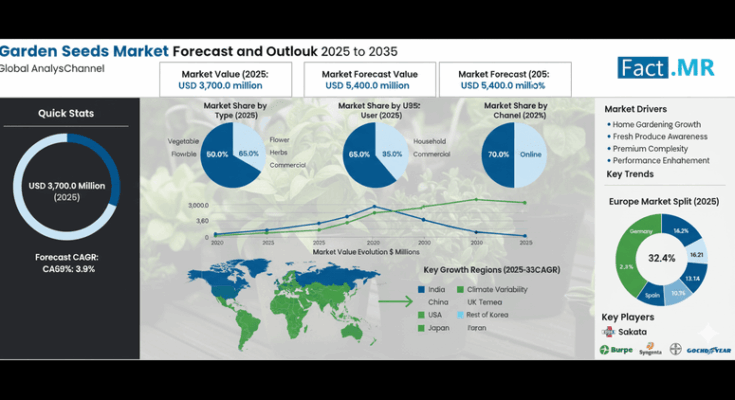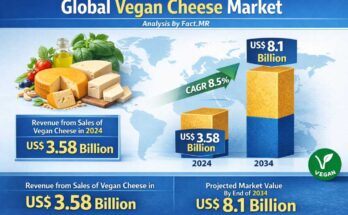The global garden seeds market is on track for robust expansion, forecast to rise from USD 3.7 billion in 2025 to approximately USD 5.4 billion by 2035, reflecting an absolute growth of USD 1.7 billion and a compound annual growth rate (CAGR) of 3.9% over the decade. This upward trajectory highlights the sector’s transition from a niche consumer category to a strategic pillar of sustainable agriculture and home-based cultivation worldwide.
Sustained Growth Driven by Lifestyle Shifts and Agricultural Innovation
The garden seeds market is projected to grow nearly 1.5 times its 2025 value as the intersection of lifestyle transformation, sustainability priorities, and agricultural modernization drives new opportunities for seed manufacturers and agricultural suppliers.
Key growth catalysts include:
- Home Gardening Revolution: The global rise in home gardening—fueled by urbanization, wellness culture, and the appeal of self-sustained produce—is generating strong demand for high-quality vegetable and herb seeds.
- Organic Farming Expansion: Increased adoption of organic and eco-friendly cultivation methods is reshaping seed preferences toward premium, genetically stable, and chemical-free varieties.
- Fresh Produce Cultivation: Consumer awareness of nutrition and food provenance is driving household and commercial growers toward seeds that ensure freshness, flavor, and consistent performance.
According to the report, vegetable seeds will continue to dominate the market, accounting for 50% of total value in 2025, supported by versatile applications in both home gardens and commercial farms. The household segment, comprising 65% of global users, remains the market’s backbone, while retail channels capture a 70% share due to strong physical distribution networks and trusted brand relationships.
Regional Outlook: Asia Pacific Leads, North America and Europe Maintain Momentum
The Asia Pacific region emerges as the growth engine of the global garden seeds market, with India (4.8% CAGR) and China (4.0% CAGR) leading through agricultural modernization, increased home gardening adoption, and government-backed horticultural initiatives.
- India is experiencing rapid agricultural innovation, combining traditional farming expertise with cutting-edge horticultural technologies. Local and global manufacturers are investing in seed processing and testing facilities, meeting rising demand for quality vegetable, flower, and herb seeds.
- China continues to expand its agricultural processing base, emphasizing genetic integrity and cost-effective cultivation solutions, positioning itself as both a leading producer and consumer of garden seeds.
- North America—particularly the United States—maintains strong performance in premium gardening and horticultural technologies, reflecting its focus on seed quality, performance validation, and agricultural compliance standards.
- Europe, led by Germany, the UK, and France, is witnessing consolidation of premium processing capabilities, with stringent regulatory standards supporting advanced horticultural manufacturing and regional specialization.
Market Dynamics: From Commodity to Precision Cultivation
Global manufacturers are transitioning from bulk seed production toward precision-engineered, application-specific varieties that deliver measurable performance benefits such as higher germination rates, improved plant vigor, and enhanced resistance to environmental stress.
The report highlights several pivotal market drivers:
- Advanced Seed Technologies: Genetic improvements and smart cultivation management systems are redefining seed development, enabling enhanced germination control and higher productivity.
- Premium Gardening Demand: The growing segment of consumers seeking performance gardening products is propelling demand for certified, traceable seed varieties.
- Performance Enhancement: Innovations in seed coatings, genetic optimization, and hybridization techniques are improving crop yield efficiency and resistance across diverse growing environments.
However, climate variability, technical growing complexities, and competition from hydroponic and controlled-environment systems remain key restraints that challenge standardization and require sustained R&D investment.
Competitive Landscape: Industry Consolidation and Specialization
The garden seeds market is characterized by an evolving competitive landscape where value is migrating from raw seed trading to performance-driven, application-ready varieties. The industry is witnessing vertical integration, supply chain consolidation, and strategic partnerships among global leaders.
Top players include Burpee Seed Company, Syngenta AG, Sakata Seed Corporation, Takii & Co. Ltd., Bayer AG (Seeds Division), Bejo Zaden B.V., Rijk Zwaan, Johnny’s Selected Seeds, and East-West Seed International.
These companies are leveraging technological innovation and certification programs to differentiate their products in a market increasingly defined by precision cultivation standards and traceability requirements.
Key competitive trends include:
- Co-development agreements between global agricultural integrators and regional horticultural companies.
- Expansion of specialized seed formulations tailored for urban gardens, high-density farming, and ornamental horticulture.
- Digitization of procurement and distribution, improving accessibility and supply reliability for both commercial growers and home gardeners.
Manufacturers with the capability to deliver performance-proven seed varieties supported by data-backed germination claims and agronomic expertise are best positioned to capture market share in the coming decade.
Regulatory and Quality Standards Define Market Entry
Stringent agricultural regulations across the EU, Japan, and South Korea are setting new global benchmarks for seed quality, documentation, and traceability. These frameworks—while presenting entry barriers—also strengthen competitive positioning for established manufacturers with advanced testing and certification infrastructure.
- Japan’s horticultural market, renowned for precision and quality, requires extensive seed validation cycles and transparency across the supply chain—creating opportunities for trusted, long-term supplier relationships.
- South Korea’s export-oriented agricultural strategy prioritizes high-specification, traceable seed imports, favoring suppliers that meet elevated performance and safety standards.
Strategic Outlook for Manufacturers and Investors
The forecasted USD 5.4 billion global garden seeds market by 2035 represents more than just volume growth—it signals the transformation of the gardening sector into a technology-enabled, performance-measured, and sustainability-driven ecosystem.
Browse Full Report : https://www.factmr.com/report/garden-seeds-market
For manufacturers and investors, the key strategic imperatives include:
- Investing in R&D and genetic engineering to develop climate-resilient, high-performance seed varieties.
- Building integrated supply chains with localized processing facilities to enhance efficiency and meet regional compliance standards.
- Developing branded retail and online strategies targeting the fast-growing household gardening segment.
- Expanding partnerships with agricultural research institutes and horticultural innovation programs to stay ahead in product certification and testing protocols.
As global consumers increasingly embrace sustainable cultivation and self-sufficient living, the garden seeds market offers a fertile ground for growth, innovation, and collaboration.



